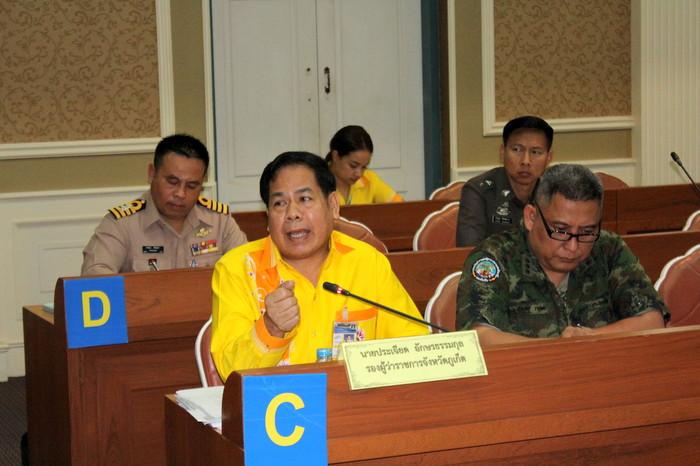Phuket V/Gov pushes Bangkok reps to buy disputed land

PHUKET: Phuket’s Vice Governor yesterday advocated national intervention in the ongoing land dispute between private property developer Baron World Trade Co and the sea gypsy community in Rawai.
Vice Governor Prajiad Aksornthammakul encouraged the National Reform Steering Assembly (NRSA) to convince Bangkok to buy up the disputed property near Rawai Pier from the developer.
The ongoing land dispute surrounding the sea gypsy village and the villagers’ access to a nearby ceremonial site has been going on for at least a couple of decades, often turning violent.
In January, more than 30 people were injured in a confrontation between Baron employees and the sea gypsies (story here).
In February, Weerachai Tantiwattanawalop, who claims to own five rai of land currently occupied by the sea gypsies, said he and other land owners submitted a letter to Prime Minister Gen Prayut Chan-o-cha asking the government to step in and buy their land (story here).
The NRSA, which advises Bangkok on social affairs, completed a circuit of sea gypsy communities in Phang Nga on Thursday, before meeting with V/Gov Prajiad and officials in Phuket.
The vice governor explained to the committee yesterday that there are five sea gypsy communities in Phuket, which comprise an estimated 4,500 people. The largest is the Rawai community in question, with 244 households and a total population of 2,063, according to provincial government estimates.
“Each of these [sea gypsy] communities has its own problems,” V/Gov Prajiad told the NRSA representatives. “The community that seems to have the most problems is the one in Rawai, with the Laem Tukkae community coming in second. Their problems are primarily economic in nature, with neighboring tourism-related demand driving up land values, because these communities are located on private land.”
“We know that almost every sea gypsy area has land conflicts, in one form or another,” V/Gov Prajiad continued. “The price of land in Phuket is very high, and that really heightens the seriousness of these problems.”
Mr Prajiad told the assembly that Phuket’s provincial government has contacted the Ministry of Interior, as well as the Ministry of Social Development and Human Security, requesting that Bangkok purchase the disputed land.
“After we buy back the land, we can move on to the next step, where we manage the land for the [Rawai sea gypsy] community. We’d also offer the villagers access to public utilities and education,” V/Gov Prajiad said. “I think that within six months or a year, the villagers will have a greatly improved quality of life.”
But NRSA chairman Anothai Ritthipanyawong said he disagreed with the proposed government buy-back scheme.
“To my knowledge, so many pieces of land across the country – and of course in Phuket – are under investigation about how the land owners obtained their title deeds,” Mr Anothai said.
“Most of the land in Phuket falls under that ambiguity, and I have a feeling that these pieces of land do so as well.”
“We cannot say at this point that the government has to buy back this land for the sea gypsies. I don’t doubt that the reason we’re at this point in the first place is because the land [documents] were illegally issued,” Mr Anothai said. “Why don’t we at least wait until the land ownership case is officially finalized in court?”
Vice Governor Prajiad was insistent that a government buyout is the best way to end the dispute.
“The owners who’ve bought the land are not the first owners of these plots. They’re the fourth or fifth owners in most cases. So, I do not think they have a clue as to how the title deeds were issued,” V/Gov Prajiad said.
“I was a member of one of the committees in proving that the sea gypsies had a right to the land years ago, and some people from that committee have actually passed away. It’s been that long. Years pass, but nothing ever really gets resolved.”
“This issue cannot wait,” he said. “People are in trouble. Children need to go to school. They need electricity and water at a reasonable price, like the rest of us.”
The vice governor said that the sea gypsies pay nearly three times more than their neighbors for electricity and water. He also noted that the sea gypsies’ houses are built next to each other and that sanitation is a concern for provincial authorities.
“Some parts of the sea in that area have been allocated as part of a national park or protected areas and the poor sanitation is affecting the marine ecosystem,” the vice governor said.
— Chutharat Plerin
Latest Thailand News
Follow The Thaiger on Google News:


























